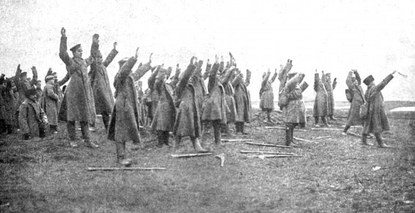


General von Hindenburg, who afterwards became the idol of the German people, was up to that time but little known beyond the district of his old Corps. Hindenburg and Ludendorff arrived in the evening of the 23rd. When he sent this order, General Ludendorff supposed that the Army Headquarters was already West of the Vistula and wanted to have it transferred beforehand to Marienburg, but as the retreat that Prittwitz had meditated had not been carried out, he really ordered us back. On the evening of the 22nd a telegram from Ludendorff announced his arrival in Marienburg on the following day with the new Commander-in-Chief who expected to find the chief commanders there. General von Prittwitz bore this stroke of fate in an extraordinarily noble manner, and he took leave of us without a single word of complaint of his hard destiny. It was only a few hours later that His Majesty's order arrived, which placed General von Prittwitz and General Count Waldersee on the unattached list. It was only in the afternoon of the 22nd that the Headquarters heard of the change in the higher command when a telegram sent to the Chief of the field railway announced the arrival of an extra train with the new Commander-in-Chief and the Chief of the General Staff. This the General Headquarters approved of. He expressed his doubts about the left flank of the Corps as it would take days to transport by rail the troops that were still on frontier duty, and therefore requested, that the 3rd Reserve Division should not be sent to the right wing of the 20th Army Corps, as the General Headquarters had ordered, but to have it sent to the left wing in the neighbourhood of Hohenstein. The reports that came in announced that the retirement of the troops before the Vilna Army had been effected surprisingly well.Ĭolonel Hell, the Chief of the General Staff of the 20th Army Corps reported that the Corps had been successfully concentrated in the neighbourhood of Hohenstein, and he received the order to draw up the Corps on the line Gilgenburg-Lahne. The Headquarters had moved on the morning of the 21st to Bartenstein and on the 22nd to Mühlhausen, in East Prussia. For example, the ist Reserve Corps and the 17th Army Corps were ordered to take a day's rest the necessity of this order may easily be doubted. Orders were sent by the General Headquarters to the Generals in command without the Commander-in-Chief being informed. The subordinate Generals in command heard of it sooner than the Commander-in-Chief. The form of their recall was uncommonly rough. There were at once difficulties with General François, and I do not know if the old Commander-in-Chief would have been able to get over them as easily as General Ludendorff did, and if he would have been able to support the strain that was put on his nerves during the next days by the question: " Will Rennenkampf advance or not ? " It is idle to ask the question: " Would it have resulted in a victory at Tannenberg if the Commanders had not been changed ? " I think : Yes-though perhaps not to so complete a victory, for the old chief commanders, as former experiences had shown, did not possess the necessary energy. How would the situation develop if these mighty movements and the enemy’s superiority in numbers delayed the decision for days? Is it surprising that misgivings filled many a heart, that firm resolution began to yield to vacillation, and that doubts crept in where a clear vision had hitherto prevailed? Would it not be wiser to strengthen our line facing Rennenkampf again and be content with half-measures against Samsonov? Was it not better to abandon the idea of destroying the Narew Army in order to ensure ourselves against destruction.

the crisis of the battle now approached. If this first blow was not final the danger for our homeland would become like a lingering disease, the burnings and murders in East Prussia would remain unavenged, and our Allies in the south would wait for us in vain.
#BATTLE OF TANNENBERG SIGNIFICANCE FREE#
Only thus could we really and completely free our old Prussian land and be in a position to do something else which was expected of us-intervene in the mighty battle for a decision that was raging between Russia and our Austro-Hungarian ally in Galicia and Poland. Only thus could we get a free hand to deal with the second enemy, Rennenkampf, who was even then plundering and burning East Prussia. We had not merely to win a victory over Samsonov.


 0 kommentar(er)
0 kommentar(er)
